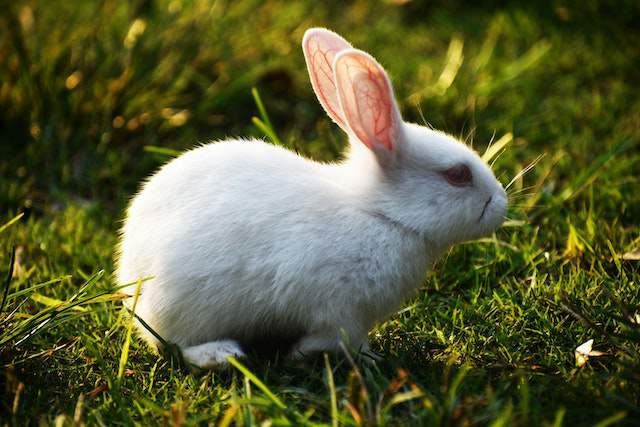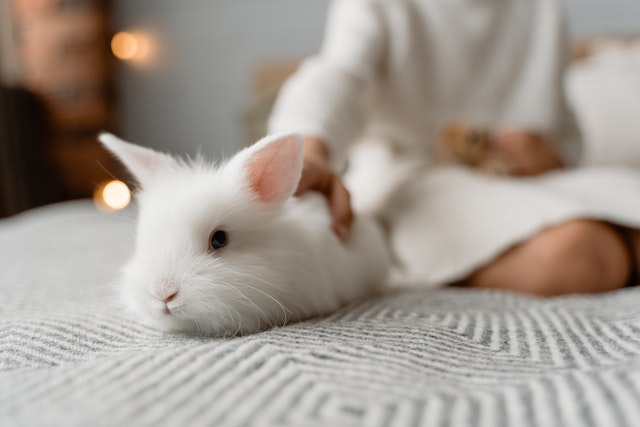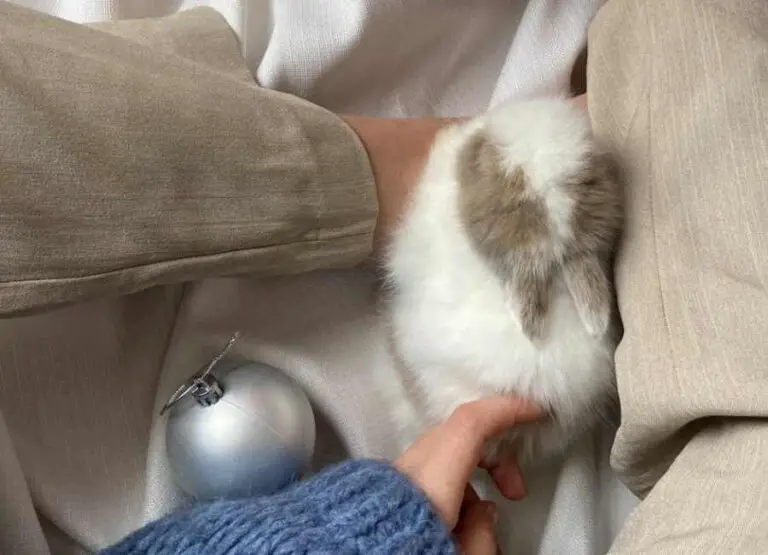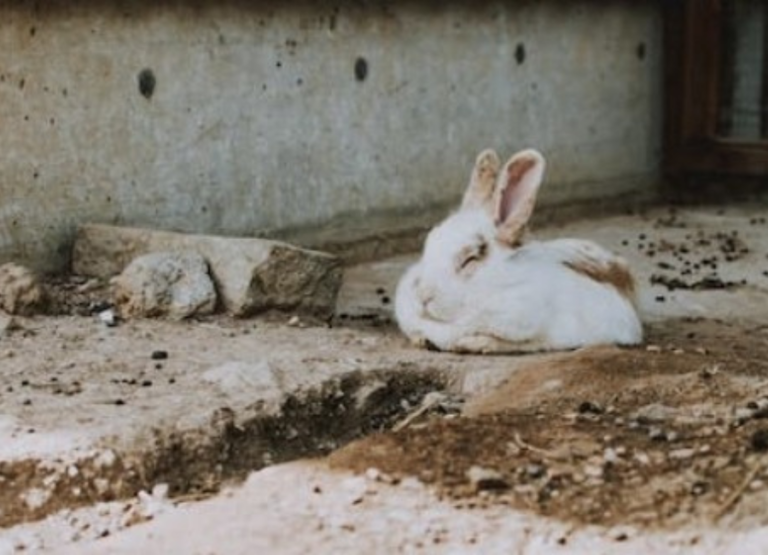12 Telltale Signs of a Depressed Rabbit With Tips

Today, I want to talk about something that’s often overlooked: the signs of a depressed rabbit.
We all know how sensitive and adorable these little furballs can be, so it’s crucial to be aware of any changes in their behavior or mood.
In this blog post, I’ll share the telltale signs that your bunny might be feeling down, and how you can help them bounce back to their happy, hoppy selves.
Let’s dive in!
Causes of Depression in Rabbits
Depression in rabbits can have various causes, including both physical and environmental factors. Here are some major causes of depression in rabbits:
1. Loneliness and Lack of Social Interaction: Rabbits are social animals and thrive in the company of other rabbits. Isolation and lack of social interaction can lead to depression in rabbits.
2. Boredom and Lack of Mental Stimulation: Rabbits are intelligent animals that require mental stimulation to stay happy and engaged. A lack of toys, activities, and environmental enrichment can contribute to depression in rabbits.
3. Inadequate Living Conditions: Rabbits need a spacious and comfortable living environment that allows them to exhibit their natural behaviors. Living in cramped or unsuitable conditions can lead to depression and stress.
4. Lack of Exercise: Rabbits are active animals that require regular exercise to maintain their physical and mental well-being. A lack of exercise can contribute to depression in rabbits.
5. Poor Diet and Nutrition: A balanced and nutritious diet is crucial for the overall health and well-being of rabbits. Inadequate nutrition or a diet lacking in essential nutrients can lead to physical and mental health issues, including depression.
6. Pain or Illness: Rabbits may experience pain or illness, which can contribute to depression. It is important to monitor rabbits for any signs of discomfort or health issues and seek veterinary care when necessary.
7. Changes in Environment or Routine: Rabbits are sensitive to changes in their environment or routine. Major changes, such as moving to a new location or a disruption in their daily routine, can cause stress and contribute to depression in rabbits.
Let’s talk about the signs you should know…
Signs of a Depressed Rabbit
Signs of a depressed rabbit may include lethargy, loss of appetite, and decreased interest in social interaction.
Other indicators can include excessive grooming or fur pulling, as well as changes in litter box habits.
Let’s dive deeper…
The following are some of the most common signs of a depressed rabbit:
1. Decreased Social Interaction
One of the signs of a depressed rabbit is a decrease in social interaction. Rabbits are social animals and thrive on companionship. If your rabbit is showing signs of withdrawal and avoiding social interaction, it may be a sign of depression.
To address this sign, consider providing your rabbit with the company of another rabbit. Rabbits generally enjoy the companionship of their own kind. Introducing a compatible rabbit to your depressed rabbit can help alleviate their loneliness and provide them with a social outlet.
However, it is important to supervise the introduction process to ensure that both rabbits are comfortable and not stressed by the presence of the other.
Additionally, spend quality time with your rabbit and engage in activities that promote social interaction. This can include gentle petting, talking to your rabbit, and playing interactive games. Creating a stimulating and enriching environment for your rabbit can also help combat depression.
2. Excessive Shedding
Excessive shedding can be another sign of a depressed rabbit. Stress and depression can lead to changes in a rabbit’s coat, resulting in increased shedding.
To address excessive shedding, it is important to identify and address the underlying cause of your rabbit’s depression. Ensure that your rabbit’s living environment is clean, comfortable, and free from any potential stressors.
Provide your rabbit with a balanced diet and ensure they have access to fresh water at all times. Regular grooming can also help manage excessive shedding and keep your rabbit’s coat healthy.
3. Excessive Chewing
Depressed rabbits may exhibit excessive chewing behavior. This can include chewing on cage bars, furniture, or other objects in their environment.
To address excessive chewing, provide your rabbit with suitable objects to chew on. This can include safe chew toys, untreated wooden blocks, or cardboard tubes.
These objects can help redirect your rabbit’s chewing behavior and provide mental stimulation. Ensure that the objects you provide are safe and non-toxic for your rabbit to chew on.
It is also important to ensure that your rabbit’s living environment is enriched and provides enough mental stimulation. This can include providing opportunities for foraging, exploring, and digging. Creating a stimulating environment can help alleviate boredom and reduce excessive chewing behavior.
4. Reduced Playfulness
Depressed rabbits may exhibit a reduced interest in play and decreased overall activity levels. They may appear lethargic and disinterested in their surroundings.
To address reduced playfulness, it is important to provide your rabbit with opportunities for physical and mental stimulation. This can include providing toys, tunnels, and obstacles for your rabbit to explore and play with. Engage in interactive play sessions with your rabbit, using toys or games that encourage movement and exercise.
Ensure that your rabbit has enough space to move around and exercise. Regular exercise is important for a rabbit’s physical and mental well-being. Consider providing a larger enclosure or allowing supervised free-roaming time in a rabbit-proofed area.
5. Sitting in the Same Place for Long Periods of Time
If you notice that your rabbit is spending extended periods of time sitting in the same spot without moving, it could be a sign of depression.
This behavior may indicate a lack of interest in their surroundings or a general sense of sadness. To address this sign, you can try the following:
- Provide mental stimulation: Offer toys, tunnels, and other enrichment activities to keep your rabbit engaged and entertained.
- Increase social interaction: Spend more time with your rabbit, providing gentle petting and grooming sessions to help them feel loved and cared for.
- Create a stimulating environment: Rearrange their living space, introduce new hiding spots, and provide different textures and surfaces for them to explore.
6. Grinding Teeth
Rabbits may grind their teeth when they are in pain or feeling stressed. Teeth grinding, also known as bruxism, can be a sign of discomfort or unhappiness. To address this sign, consider the following steps:
- Check for dental issues: Schedule a visit to the veterinarian to rule out any dental problems that may be causing pain or discomfort.
- Provide a comfortable environment: Ensure that your rabbit has a quiet and safe space where they can relax and feel secure.
- Reduce stressors: Identify and eliminate any potential stressors in your rabbit’s environment, such as loud noises or sudden changes.
7. Excessive Digging or Scratching
Rabbits may engage in excessive digging or scratching behaviors when they are feeling anxious or bored. This behavior can be a sign of frustration or a need for mental and physical stimulation. To address this sign, try the following:
- Provide appropriate outlets for digging: Set up a designated digging area with safe materials like shredded paper or hay for your rabbit to satisfy their natural instincts.
- Offer interactive toys: Provide toys that encourage physical activity and mental stimulation, such as puzzle feeders or treat-dispensing toys.
- Increase playtime: Engage in interactive play sessions with your rabbit using toys or gentle games like hide-and-seek.
8. Change in Eating Habits
A change in eating habits, such as a decrease in appetite or a refusal to eat, can be a sign of depression in rabbits.
Loss of interest in food is often an indication of underlying emotional distress. To address this sign, consider the following steps:
- Consult a veterinarian: Schedule a check-up with a rabbit-savvy veterinarian to rule out any medical conditions that may be affecting your rabbit’s appetite.
- Offer a varied diet: Provide a diverse range of fresh vegetables, hay, and high-quality pellets to entice your rabbit to eat.
- Monitor feeding habits: Keep track of your rabbit’s eating patterns and ensure they are consuming an adequate amount of food. If necessary, hand-feed or syringe-feed critical care food to maintain their nutrition.
9. Lack of Interest in Toys or Treats
A depressed rabbit may show a lack of interest in toys or treats, which can be a sign of reduced motivation and enjoyment. It’s important to address this sign to help improve the rabbit’s mental well-being. Here are some steps to take:
- Provide a variety of toys and treats: Offer a range of toys and treats to stimulate the rabbit’s interest. Experiment with different textures, shapes, and flavors to find what they enjoy the most.
- Rotate toys: Regularly rotate the toys to keep them fresh and interesting. This can help prevent boredom and encourage the rabbit to engage with their environment.
- Interactive play: Engage in interactive play sessions with the rabbit using toys such as puzzle feeders or treat-dispensing toys. This can help stimulate their natural instincts and provide mental stimulation.
- Positive reinforcement: Use positive reinforcement techniques to encourage the rabbit to engage with toys and treats. Reward them with praise or a small treat when they show interest or interact with the toys.
- Observe and adapt: Pay attention to the rabbit’s preferences and adjust the toys and treats accordingly. Some rabbits may prefer certain types of toys or treats, so it’s important to cater to their individual preferences.
10. Pulling at Their Fur and Over-grooming
Pulling at fur and over-grooming can be signs of stress or anxiety in rabbits. It’s important to address this sign to prevent potential health issues and improve the rabbit’s well-being. Here’s how to address it:
- Identify the underlying cause: Determine the cause of the stress or anxiety that is leading to over-grooming. It could be due to changes in the environment, lack of stimulation, or social issues.
- Provide a safe and enriched environment: Ensure the rabbit has a comfortable and enriched living space. Provide hiding spots, tunnels, and toys to keep them mentally stimulated and reduce stress.
- Reduce stressors: Identify and minimize any potential stressors in the rabbit’s environment. This could include loud noises, excessive handling, or changes in routine. Create a calm and predictable environment for the rabbit.
- Increase social interaction: Spend quality time with the rabbit, providing gentle and positive interactions. This can help reduce stress and provide comfort.
- Consult a veterinarian: If the over-grooming persists or worsens, consult a veterinarian to rule out any underlying medical conditions. They can provide guidance and recommend appropriate treatment options.
11. Lethargy/Lack of Interest in Physical Activity
Lethargy and a lack of interest in physical activity are common signs of depression in rabbits. It’s important to address this sign to improve the rabbit’s overall well-being. Here’s what you can do:
- Provide a stimulating environment: Create an environment that encourages physical activity. Offer tunnels, ramps, and platforms for the rabbit to explore and play on. This can help stimulate their natural instincts and encourage movement.
- Encourage exercise: Engage in interactive play sessions with the rabbit using toys such as balls or tunnels. Gently encourage them to move and explore their surroundings.
- Offer a balanced diet: Ensure the rabbit is receiving a balanced diet that provides the necessary nutrients for energy and overall health. Consult a veterinarian for guidance on the appropriate diet for your rabbit’s specific needs.
- Regular veterinary check-ups: Schedule regular check-ups with a veterinarian to monitor the rabbit’s health and address any underlying medical conditions that may be causing lethargy.
- Monitor for improvement: Keep track of the rabbit’s activity levels and monitor for any improvements. If there is no improvement or the lethargy persists, consult a veterinarian for further evaluation.
12. Hiding/Self-isolation
Hiding or self-isolation is a common behavior exhibited by depressed rabbits. It’s important to address this sign to help the rabbit feel safe and secure. Here’s how to address it:
- Provide hiding spots: Ensure the rabbit has access to hiding spots in their living space. This can include tunnels, boxes, or covered areas where they can retreat to when they feel the need for privacy or security.
- Create a quiet environment: Minimize loud noises and disturbances in the rabbit’s environment. Create a calm and quiet space where they can feel safe and comfortable.
- Avoid excessive handling: Give the rabbit space and avoid excessive handling, especially if they show signs of stress or discomfort. Allow them to approach and interact with you on their own terms.
- Offer positive interactions: Spend time near the rabbit’s hiding spot, talking softly and offering treats or gentle strokes. This can help build trust and encourage the rabbit to feel more comfortable and less inclined to hide.
- Consult a veterinarian: If the hiding behavior persists or worsens, consult a veterinarian to rule out any underlying medical conditions or to seek further guidance on addressing the rabbit’s behavior.
How to Help a Depressed Rabbit Get Better
Helping a depressed rabbit get better involves several approaches. Here are some major ways to help a depressed rabbit:
1. Get Them a Companion Rabbit
Rabbits are social creatures and thrive in the company of other rabbits. Getting your depressed rabbit a companion can provide them with valuable companionship, playtime, and grooming opportunities. It can also help ease their predation anxiety and make them happier overall.
2. Spend Quality Time With Your Rabbit
Make sure to spend plenty of time with your rabbit, providing them with socialization, attention, and affection. This can help alleviate their feelings of loneliness and depression. Engage in activities that your rabbit enjoys, such as gentle petting, grooming, or playing with toys.
3. Maintain a Consistent Routine
Rabbits are creatures of habit and feel most secure when they have a routine to follow. Establish a daily schedule for feeding, socializing, and providing other forms of care for your rabbit. This consistency can help reduce stress and anxiety, promoting a sense of stability and well-being.
4. Create a Stimulating Environment
Enrich your rabbit’s living space with toys, tunnels, and other forms of environmental enrichment. This can help keep them mentally stimulated and engaged, preventing boredom and depression. Provide hiding places and safe spaces where your rabbit can retreat to when they need some alone time.
5. Provide a Healthy Diet
Ensure that your rabbit is receiving a balanced and nutritious diet. A healthy diet can contribute to their overall well-being and may help improve their mood. Consult with a veterinarian to determine the best diet for your rabbit’s specific needs.
6. Offer Opportunities for Exercise
Regular exercise is important for a rabbit’s physical and mental health. Provide your rabbit with ample space to hop, run, and explore. You can also set up obstacle courses or play games with your rabbit to keep them active and engaged.
7. Provide Emotional Support and Patience
Offering emotional support and patience is vital when helping a depressed rabbit. Spend quality time with the rabbit, offering gentle petting and soothing words. Be patient and understanding as the rabbit adjusts to changes and recovers from depression.
8. Monitor for Signs of Illness
Depression in rabbits can sometimes be a symptom of an underlying health issue. Keep an eye out for any changes in your rabbit’s behavior, appetite, or physical condition. If you notice any concerning signs, consult with a veterinarian to rule out any medical causes.
9. Provide a safe and comfortable living environment
Ensure that your rabbit’s living environment is clean, safe, and comfortable. Provide them with a suitable enclosure or hutch that allows for adequate space, ventilation, and protection from predators. Regularly clean their living area to maintain hygiene and prevent the buildup of odors or waste.
10. Seek Veterinary Care
If your rabbit’s depression persists or worsens despite your efforts, it’s important to consult with a veterinarian. They can assess your rabbit’s overall health and provide appropriate treatment or recommendations to help improve their well-being.
Remember, each rabbit is unique, and what works for one may not work for another. It’s important to observe your rabbit’s behavior and adjust your approach accordingly. If you’re unsure or concerned about your rabbit’s well-being, don’t hesitate to seek professional advice from a veterinarian or an experienced rabbit caretaker.
Read more about ways of showing your rabbit you love them.
Preventing Depression in Rabbits
Preventing depression in rabbits is an important aspect of their overall well-being. Here are some major approaches that can help prevent depression in rabbits:
1. Provide a suitable living environment: Rabbits need a spacious and enriched living environment to thrive. They should have enough space to hop, run, and explore. Provide them with hiding places, tunnels, toys, and platforms to keep them mentally stimulated and engaged.
2. Socialization and companionship: Rabbits are social animals and thrive in the company of other rabbits. Consider keeping rabbits in pairs or small groups to prevent loneliness and provide companionship. Ensure that the rabbits are properly introduced and compatible with each other.
3. Regular exercise and playtime: Rabbits need regular exercise to stay physically and mentally healthy. Provide them with opportunities for supervised playtime outside of their enclosure, allowing them to explore and exercise in a safe and secure area.
4. Balanced diet: A balanced and nutritious diet is essential for the overall health of rabbits. Provide them with a diet that includes fresh hay, fresh vegetables, and a limited amount of pellets. Avoid overfeeding or providing an unbalanced diet, as it can lead to obesity and other health issues.
5. Mental stimulation: Rabbits are intelligent animals and need mental stimulation to prevent boredom and depression. Provide them with toys, puzzles, and activities that encourage natural behaviors like foraging and digging. Rotate and change the toys regularly to keep them engaged.
6. Regular veterinary care: Regular veterinary check-ups are important to ensure the physical and mental well-being of rabbits. Schedule routine visits with a rabbit-savvy veterinarian to monitor their health, address any medical issues promptly, and discuss any concerns about their behavior or mood.
7. Bonding and interaction with humans: Rabbits can form strong bonds with their human caregivers. Spend quality time with your rabbit, providing gentle handling, grooming, and positive interactions. This helps build trust and strengthens the bond between you and your rabbit.
Remember, each rabbit is unique, and it’s important to observe their behavior and adjust their care accordingly.
Frequently Asked Questions
How can I tell if my rabbit is depressed?
Rabbits, like humans, can display signs of depression. Look for changes in behavior such as decreased appetite, lethargy, hiding, excessive grooming, or loss of interest in activities. If you notice these signs, it’s important to consult with a veterinarian to rule out any underlying health issues.
Can a rabbit’s environment contribute to their depression?
Yes, a rabbit’s environment plays a crucial role in their well-being. Lack of mental stimulation, inadequate space, or social isolation can lead to depression in rabbits. Ensuring they have enough space to hop and play, providing toys and companionship, and creating a safe and enriching environment can help prevent or alleviate rabbit depression.
Are there any specific triggers that can cause depression in rabbits?
Yes, there can be various triggers that contribute to rabbit depression. Major changes in their routine, such as moving to a new home or the loss of a companion, can be distressing for rabbits. Additionally, loud noises, frequent disruptions, or lack of a secure hiding place can also contribute to their emotional well-being.
Can rabbits experience grief or sadness?
Absolutely! Rabbits are social animals and can form strong bonds with their companions, both human and animal. If a rabbit experiences the loss of a bonded partner, they can go through a grieving process and exhibit signs of sadness or depression. Providing extra love, attention, and companionship during this time can be beneficial for their emotional recovery.
How can I help my depressed rabbit?
If you suspect your rabbit is depressed, it’s important to consult with a veterinarian to rule out any underlying health issues. Additionally, you can help by providing a stimulating and enriching environment, spending quality time with your rabbit, offering them healthy treats, and ensuring they have a proper diet and exercise routine. Socializing with other rabbits, if appropriate, can also help alleviate their depression.
When should I seek professional help for my depressed rabbit?
If you’ve tried various methods to help your rabbit overcome their depression but haven’t seen any improvement, it’s important to seek professional help. A veterinarian who specializes in exotic pets or a rabbit-savvy animal behaviorist can provide valuable guidance and offer specific strategies to address your rabbit’s emotional well-being.
Read more about dealing with a stressed rabbit.
Conclusion
In conclusion, remember that rabbits, just like humans, can experience feelings of depression.
If you notice any changes in your rabbit’s behavior, such as loss of appetite or lack of interest in activities, it’s important to seek professional help.
By understanding the signs of a depressed rabbit, we can provide the care and support they need to live a happy and healthy life.

![How to Comfort a Dying Rabbit [12 Helpful Strategies] How to Comfort a Dying Rabbit](https://petcreeks.com/wp-content/uploads/2023/10/How-to-Comfort-a-Dying-Rabbit.jpg)
![12 Abnormal Rabbit Behaviour [Meaning & Tips] Abnormal Rabbit Behaviour](https://petcreeks.com/wp-content/uploads/2023/10/pexels-magda-ehlers-9348913.jpg)



